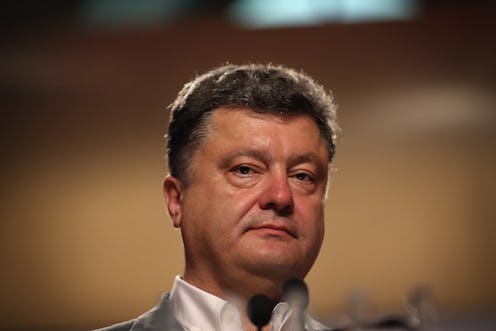News
What Ukraine's Deal With The EU Really Means
After months of political upheaval and the eventual annexation of Crimea by Russia, Ukrainian President Petro Poroshenko has put pen to paper on the deal that started all the tumult: Ukraine has now signed an European Union trade agreement. When the deal was first on the table months ago, it was eschewed by then-President Viktor Yanukovych, an indication he wanted to keep Ukraine economically and politically in line with Russia, not the European states.
Now, after Yanukovych's decision to abandon the deal prompted his ousting by popular uprising, Poroshenko has hailed its signing as "a really historic date for Ukraine." He even signed the deal using the very same pen Yanukovych was supposed to, before he abandoned it and set his own downfall in motion.
The deal, as detailed by CNN, mandates a free trade zone in Ukraine, and for the eastern European state to adhere to certain standards on democracy and human rights — standards likely more solid than those necessitated by an economic alliance with Russia. And the deal has prompted deep anger from within the Russian government, where the deal is seen as an effort to weaken their influence and economic ties over former Soviet satellite states.
Sergei Glazyev, a senior aide to President Vladimir Putin, decided to break Godwin's law straight-away, calling Poroshenko a Nazi, and the agreement a "Nazi Frankenstein" to the BBC.
The timing of the deal does risk new political turmoil, in spite of the outpouring of support from the majority of the Ukrainian public. What exactly will it mean going forward? Here are a few outcomes to consider.
1. Russia is Angry, and That's Not a Good Thing
Within Ukraine since the fall of Yanukovych, there's been a very understandable tension between proponents of a closer Russian alliance and those who desire closer European ties, with pro-Russian separatist movements taking violent action which has left hundreds dead since February.
In addition the that Nazi barb by Glazyev, Russia's official posture towards Ukraine has become highly intimidating in recent months. In spite of how swiftly the news of the Russian annexation came and went, it wasn't some casual, peaceful interlude — the Russian armed forces were mobilized in the midst of it, actions for which key officials were slapped with international sanctions. The EU has suggested that more sanctions could be imposed if pro-Russian forces in Ukraine don't halt their aggressive campaign.
Russia has responded to this Ukrainian defiance with a threat of "grave consequences," though Putin spokesman Dmitry Peskov told the AP that their reaction wouldn't come until "negative consequences arise for the economy. In order for those to arise, the signed agreement needs to be implemented."
2. Poroshenko Gets His Victory Lap
It really can't be overstated, both in terms of Ukrainian economics and society, just how monumental Poroshenko's signing of the EU deal is. In the months leading up to its passage, a majority of the Ukrainian public backed the plan to edge away from Russia and forge european alliances.
It's an achievement which Poroshenko isn't letting slip by without some requisite celebration, either, even in the face of a tenuous ceasefire with pro-Russian forces. As quoted by CNN, Poroshenko called the agreement the second-most important moment in the country's history, outpaced only by their independence from Russia in 1991:
The document we will sign today is not just political and economic, it is a symbol of faith and unbreakable will. It is a tribute to people who gave their lives and health to make this moment happen, and it is the strongest reminder that today's Europe is and must be about people's determination to live in a better and safer world.
3. This is the First Step to EU-member Ukraine
The decision to join up with the EU on this trade agreement isn't a conclusion for Ukraine, but a starting point. Poroshenko told CNN that his decision to sign the deal was a "unilateral statement" of the long-term goal of his government — outright membership in the EU.
As it stands now, 28 different countries comprise the union, with the tiny island of Cyprus its most eastern member state.
But an admission of Ukraine into the EU would be the deepest foray into a former Soviet bloc of eastern Europe yet, and it stands to reason that Russia will do whatever they can to — overtly or though diplomatic pressure — to stop that from happening.
